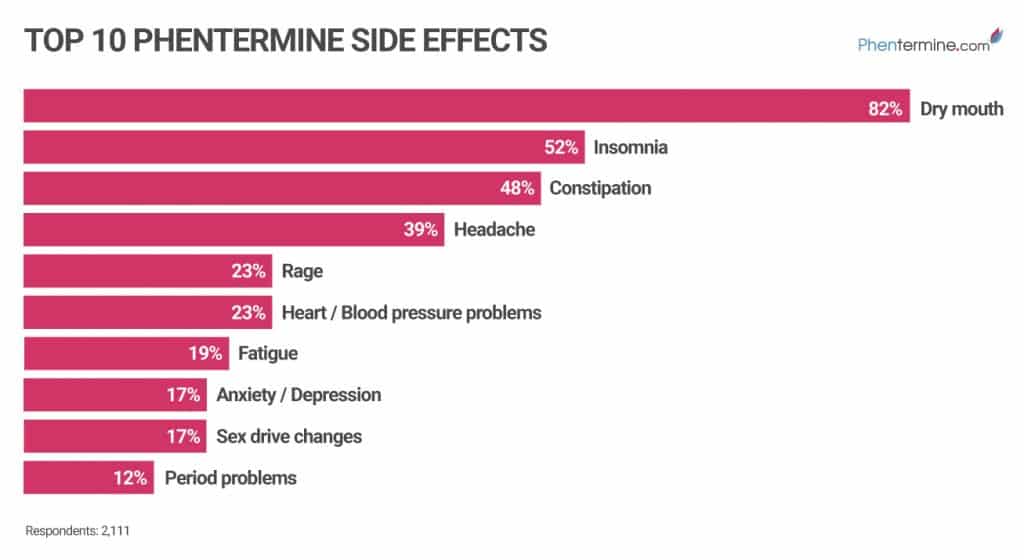Phentermine Insomnia: Causes & Sleep Solutions
Medically reviewed by Dr. Marcus Goodman on October 1, 2025.
Phentermine promotes weight loss by triggering the release of hormones that suppress hunger signals and boost concentration and alertness.
However, as a result of this increased energy and alertness, many patients battle phentermine insomnia. When persistent, this common phentermine side effect can make getting enough sleep a frustratingly difficult task.
Too busy for the full read? Here’s what you need to know:
Does Phentermine Cause Insomnia?
Yes, phentermine causes insomnia.
In fact, a recent online poll by Phentermine.com confirmed that over 50% of phentermine users report insomnia while using the medication, right after the most reported phentermine side effect, dry mouth (

Why Phentermine Causes Insomnia
Phentermine functions as a central nervous system (CNS) stimulant, in many ways similar to amphetamine. It increases levels of a class of chemicals in the brain called catecholamines, which include dopamine and norepinephrine (also known as noradrenaline).
This chemical change produces a temporary but significant boost in energy and a decrease in appetite, which is what helps patients lose weight (
Patients’ increased levels of energy and alertness often persist into the night, making it difficult to fall asleep, despite feeling extremely tired.
How Long Does Phentermine Insomnia Last?

Many patients experience insomnia during the first few days or weeks of treatment, but most people experience some relief as the body adjusts to phentermine.
If this side effect continues (e.g. you are still experiencing phentermine insomnia after 2 months), consult with your doctor. He or she may suggest a lower dose, amend your dosing schedule or suggest lifestyle modifications to help you overcome this side effect.
Contact your prescribing doctor if phentermine insomnia persists past the first week of treatment, grows more severe, or interferes with your daily tasks.
How to Deal with Phentermine Insomnia
Phentermine insomnia can keep you up for hours or even days at a time, despite intense feelings of tiredness. Many people wonder how to fall asleep while taking phentermine. There is no magic phentermine insomnia cure, but there are some common strategies that help phentermine insomnia go away.
If you find yourself battling recurrent insomnia, try these five simple tips to sleep when on phentermine:
1. Take Phentermine Earlier
Take phentermine first thing in the morning to reduce the risk of phentermine insomnia. Most patients take their pill on an empty stomach, either 30 minutes before or 1-2 hours after breakfast.
Phentermine reaches its maximum potency in the blood after about 1-3 hours and is completely absorbed in 4-6 hours, depending on physical activity and the amount of food in the stomach (
So, doctors and pharmacists recommend taking the last dose pill at least 8-10 hours before bedtime to minimize medication-related insomnia.
2. Cut Out Caffeine
Excess caffeine consumption interferes with your ability to get enough restful, reparative sleep.
More, it’s best to steer clear of caffeinated beverages while taking phentermine due to the medication’s already-strong stimulant effects. Consuming caffeine while taking phentermine can cause or exacerbate adverse reactions like racing heart, chest pain, or high blood pressure (
Avoid coffee, caffeinated tea, colas, and energy drinks – all of which contain caffeine. Instead, opt for caffeine-free and sugar-free options, such as water, milk, or herbal tea.

3. Get Moving
One way to burn off the extra energy from phentermine and reduce insomnia is to increase daily activity. This can come in the form of either formal workouts or simply moving more throughout the day.
Research suggests that exercising first thing in the morning is most effective in combating insomnia. In fact, the National Sleep Foundation reports that “people who work out on a treadmill at 7:00 am sleep longer, experience deeper sleep cycles, and spend 75 percent more time in the most reparative stages of slumber than those who exercise at later times that day” (
But don’t worry: afternoon workouts also help combat insomnia. The only time of day that exercise does not help with insomnia from phentermine is late at night.
Aerobic exercise too close to bedtime increases core body temperature and signals your body not to sleep. If you have some extra energy late at night, opt for a more relaxing exercise like yoga or stretching (
4. Disconnect Before Bed
Research shows that too much screen time negatively affects users’ mental health and can interfere with restful sleep (
5. Make Your Bedroom an Oasis
Keep your bedroom free of technological devices, work, or other distractions. By designating the room as a space for rest and relaxation, you’re signaling to your brain that a bedroom is a place for sleep, not stress and wakefulness.
Take a moment to consider the physical environment in your room as well. Make sure your bedroom is a comfortable temperature for sleeping (preferably on the cooler side) and that light from the street or other rooms is kept to a minimum.
Patient Tips On How to Deal With Sleep Problems With Phentermine
I started phentermine in December also and the insomnia for me was right away . I was on 15 mg., after a few weeks it was better . My doctor just upped my dose to 37.5mg and yep, 3 am is usually about when I wake up and just can’t get back to sleep . I’m going to try the slow release Melatonin and see if that can help keep me asleep.
Lori M. A.
I took Benadryl at bed time for a week and now the insomnia is over.
Rachel S.
I take half in the morning about 30 minutes to an hour before breakfast and then I take my other half right before lunch. for whatever odd reason that is the only thing that helps me with sleep.
Jamie W.
Sleep Hygiene Checklist for Managing Phentermine Insomnia
Day 1–3: Immediate adjustments
- Take phentermine as early in the morning as possible.
- Eliminate afternoon/evening caffeine (coffee, tea, energy drinks, chocolate).
- Start a consistent bedtime routine: disconnect from screens, dim lights, and aim for the same sleep/wake times daily.
Week 1: Build healthy habits
- Add daily physical activity (morning or early afternoon is best).
- Practice relaxation techniques (deep breathing, meditation, or gentle yoga).
- Create an optimal sleep environment: cool, dark, quiet bedroom.
Week 2 and beyond: Monitor and adapt
- If insomnia persists, discuss options with your doctor (dose adjustments, timing changes, or short-term sleep aids like melatonin under guidance).
- Keep a sleep diary to track patterns and identify triggers.
When to call your doctor
- If you are unable to sleep most nights for more than a week.
- If lack of sleep causes significant fatigue, mood changes, or interferes with daily functioning.
- If insomnia persists despite making lifestyle and timing adjustments.
Frequently Asked Questions
Does phentermine cause insomnia?
Yes. Because it’s a stimulant, phentermine often makes it harder to fall or stay asleep, especially if taken later in the day.
How long does phentermine insomnia last?
It usually improves within a few days to weeks, but some people continue to experience sleep problems throughout treatment.
What helps with phentermine insomnia?
Taking the medication early in the morning, avoiding caffeine, exercising during the day, and practicing good sleep hygiene (a dark, cool, quiet bedroom) can make a big difference.
Should I stop phentermine if I can’t sleep?
Don’t stop on your own. If insomnia is severe or persistent, consult your doctor — they may adjust your dosage, timing, or explore alternative treatments.
Can you take sleeping pills with phentermine?
Phentermine and melatonin are a common combination, especially for patients struggling with insomnia. However, the experts still don’t know much about phentermine’s interaction with other sleeping pills. While some combinations can be dangerous, others may aid in sleep and facilitate weight loss. It is crucial to discuss this with your prescribing physician and pharmacist.
- Cosentino, G., Conrad, A., & Uwaifo, G. (2011). Phentermine and topiramate for the management of obesity: A review. Drug Design, Development and Therapy, 267. doi:10.2147/dddt.s31443
- Members of “Losing Weight with Phentermine” Support Group on Facebook & Phentermine.com Forum. (2019, March 13). [User Report of Common Phentermine Side Effects]. Unpublished raw data.
- U.S. National Library of Medicine. (2006, January 12). PHENTERMINE.
- Dr. Rick, MD. (2012, April 02). Phentermine 37.5 mg/daily in moring. My question is how does…
- Drugs.com. (2019, January). Caffeine and Phentermine Drug Interactions.
- National Sleep Foundation. (2018). What Time of Day to Exercise for Better Sleep.
- Thomée, S., Härenstam, A., & Hagberg, M. (2012). Computer use and stress, sleep disturbances, and symptoms of depression among young adults – a prospective cohort study. BMC Psychiatry, 12(1). doi:10.1186/1471-244x-12-176

